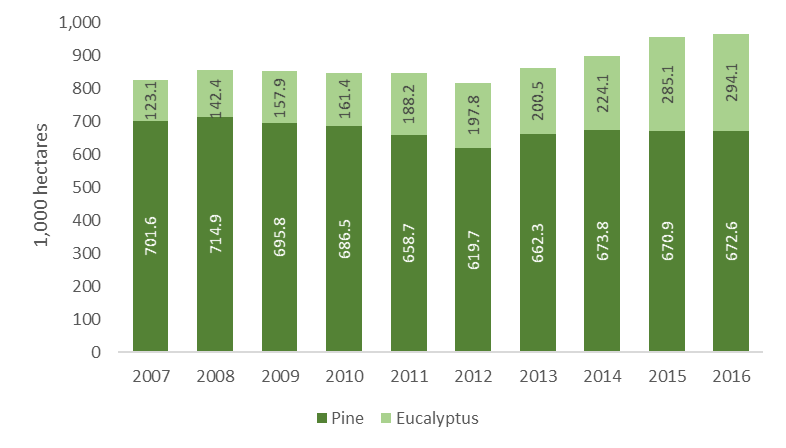2 min read
Brazil Forest Industry: Is Demand for Eucalyptus in Paraná Here to Stay?
 Marcelo Schmid
:
February 19, 2018
Marcelo Schmid
:
February 19, 2018

The state of Paraná is home to Brazil’s most productive pine lumber manufacturers. As such, pine is the primary species grown across Paraná in terms of total area planted (Figure 1). However, in a study on the eucalyptus market in the central region of Paraná, Forest2Market detected an increase in the consumption of eucalyptus fiber. The prospects for eucalyptus demand by segment are presented below.
Figure 1. Historical evolution of planted area in Paraná 
Source: Brazilian Tree Industry (IBÁ)
Pulp: The pulp segment is the main consumer of eucalyptus fiber in the region in terms of volume; Klabin—one of the largest pulp producers in the region—operates two manufacturing facilities in the area. Together, these factories consume roughly 6 million tons of eucalyptus per year.
Klabin has plans to expand its production of cellulose fluff (pulp material used primarily in the manufacture of disposable diapers and sanitary napkins) from the installation of a new facility in 2025, but the exact location of the new site is yet to be determined. The new development could occur in either Paraná or the state of Santa Catarina, and the facility could be designed to process either pine or eucalyptus.
Panels: The Paraná panel segment is dominated by both medium- and large-scale companies such as Arauco, LP Brazil, Sudati and Repinho. Most of these companies are set up to use both pine and eucalyptus fiber, often consuming one species in greater proportions compared to the other.
However, some of these companies are planning to increase their consumption of eucalyptus fiber; other companies, who previously consumed only pine, are planning to expand their operations to start consuming eucalyptus. As the Brazilian economy continues to recover, demand for panels is expected to increase as this product is closely related to construction and furniture industries.
Energy: The outlook for the forest biomass and energy market is optimistic due to the constant growth of the food industry, which uses eucalyptus for grain drying and steam generation. Opportunities for creating power from renewable resources are also growing among the broader business sector. Asperbras is a prime example of this; the company will soon begin producing energy from eucalyptus biomass in the central region of Paraná.
In addition, the region is witnessing a growing interest in the even smaller-scale “micro” and “minigeration” energy businesses, which extends to individual landowners and homeowners. These energy generators produce up to 75 kW (microgeneration), or up to 5MW (minigeneration) supplied by qualified cogeneration or renewable energy sources, which are regulated by The Brazilian Electricity Regulatory Agency. The system allows these entities to install power stations to supply their own energy needs as an extension of the distribution network; any energy surplus is then injected back into the grid. This process generates credits for these energy producers to be used as discounts on future energy bills.
Lumber: The area has experienced a decrease in the planted area and management of pine plantations in recent years thereby reducing the supply of pine fiber—particularly large-diameter pine logs. Eucalyptus plantations have been more attractive due to the shorter harvest rotations, allowing for greater productivity. In addition, due to the physical properties of eucalyptus wood, the species may be a market substitute for some tropical woods from the Amazon, as well as certain American hardwoods. Some sawmills have resorted to processing eucalyptus as a way to meet rising demand for sawn products. However, a number of smaller sawmills have not adapted their production process to accept eucalyptus and therefore face several difficulties in sawing and drying the product.
While the eucalyptus market is still quite small compared to the pine market across the region, the consumption of eucalyptus logs is increasing in the central region of Paraná. Some forest products segments, such as the energy and panels industries, are demonstrating great success with eucalyptus that will lead to increased demand for the species in the future.
However, no concrete data suggests that eucalyptus is going to gain long-term popularity and success within the sawn wood segment of the study area. On the contrary, Forest2Market do Brasil has been following the growing interest that investment groups have in acquiring pine plantations in Paraná; the expectation is that sawmills will continue to consume larger volumes of pine fiber, impeding eucalyptus growth in the near future.





